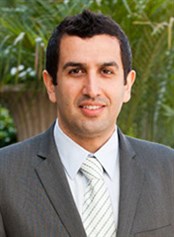 Dr. Roozbeh Jafari, associate professor in biomedical engineering, computer science and engineering and electrical engineering (courtesy appointment), joined the Department of Computer Science and Engineering at Texas A&M University in August 2015.
Dr. Roozbeh Jafari, associate professor in biomedical engineering, computer science and engineering and electrical engineering (courtesy appointment), joined the Department of Computer Science and Engineering at Texas A&M University in August 2015.
Jafari is the director of the Embedded Signal Processing (ESP) Lab. His research interests include embedded systems design, wearable computing, signal processing and cyber-physical systems.
His current research focuses on wearable devices that target multiple areas including long term in-home health monitoring, rehabilitative therapy and enhancing the communication capability of the disabled. MotionNet, BioWatch, and HealthHub are just a few of the prototypes the ESP lab has developed.
“My objective for my students and my team is to change the world,” Jafari said. “I don’t know how far we can get, but that’s our goal.”
Computer science and engineering students, Jian Wu and Viswam Nathan, work alongside Jafari in the ESP lab.
Wu said that the most exciting aspect of the research is to see how his work will impact people’s lives.
“I am really excited with the American Sign Language Recognition system since it helps clear the communication barrier between deaf people and people who don't know sign language,” Wu said.
“The thing I enjoy most about working in the Embedded Signal Processing Lab is the opportunity to approach problems from many different perspectives of engineering,” Nathan said. “I've learned several concepts about statistics, networking and signal processing by just working and collaborating on various projects.”
Prior to joining the Texas A&M faculty, Jafari was an associate professor in electrical engineering at the University of Texas at Dallas. He received his bachelor’s in electrical engineering at the Sharif University of Technology in Iran, his master’s and Ph.D. in computer science at the University of California, Los Angeles and was a post-doctoral fellow at the University of California, Berkeley.